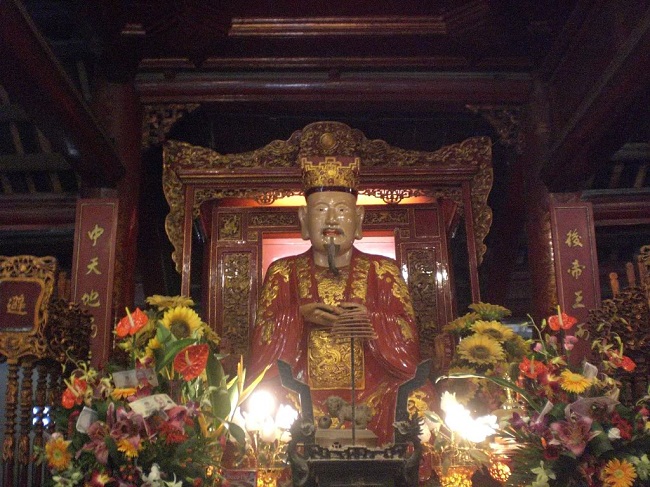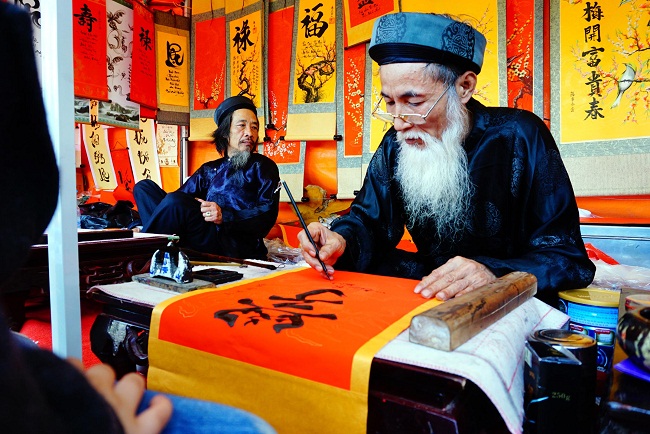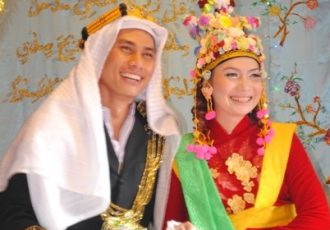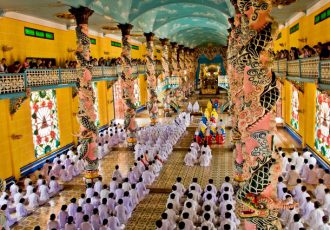The legend of Confucius
Based on the teachings of Confucius (551-479) BCE, Confucianism (Nho giao or Khong giao, in Vietnamese) is rather than a religion, a political and social morality that dictates to everyone his place, rights and duties within the family as well as in society, in order to ensure peace and order.
Master Kong never formulated his theories in writing, it was his disciples who gathered in the Lunyu (The Interviews) his comments and aphorisms. Confucianism, which was erected as a state philosophy by the Chinese Han Dynasty (206 BC, -220 AD. J-C) and entered Vietnam at the same time, profoundly shaped the social behaviours of the Vietnamese.

The principles of Confucianism
According to Confucius, every good man must implement two complementary principles, Jen (virtue, humanity, goodness) and Yi (justice), and possess several moral qualities: filial piety (assured speaks of ancestor worship), respect for rites and rules of precedence, loyalty, fidelity to the word given, courage.
Confucius defines five “natural relationships” to which everyone must conform to ensure order and social cohesion:
- Father/son relationship (the son must obey his father without reservation),
- Male/female relationship (women have no individual rights)
- Elder/Cadet Ratio
- Friend/friend ratio,
- Prince/subject ratio (same as father/son relationship).
Complex and precise rites make it possible to seal this set of relationships. To be entitled to rule, the prince must study the five Classics:
- The Book of Odes
- The Book of Documents
- the Book of Rites
- the Annals of Spring and Autumn
- the Book of Mutations
He must comply with their prescriptions and be benevolent towards his subjects. Royal virtue was to harmonize nature and society by its influence alone.

Confucianism in the history of Vietnam
Confucianism emphasizes education. Anyone can delve deeper into the five Classics. Knowledge is not the privilege of birth, but of personal merit and determination. After a millennium of Chinese presence, far from the last Confucian contribution, the Ly instituted in the eleventh century the first Mandarin competitions intended to train the cadres of the empire.
These competitions, in principle open to all (except actors and women), presupposed the perfect knowledge of the five Classics but also that of Buddhist and Taoist principles.
In 1802, when the Nguyen Dynasty ordered the reunification of Vietnamese territory, Confucianism was elected the official doctrine of the empire. But, unfortunately, this fixed Confucianism, attached to its values and principles considered immutable. He, therefore, was unable to cope with the upheavals initiated by the opening to the West.
Indeed, the French colonizers brought with them the new principles of exact sciences and industrial revolution, which the immobility of the neo-Confucians of Hue disdained. The extreme rigidity of the mandarins who surrounded the last Nguyen emperors partly explains the fall of this dynasty.



